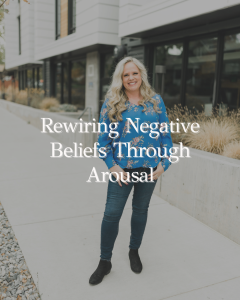
Sexual rejection is one of the most painful experiences in marriage, but is your spouse really rejecting you or just rejecting sex? In this episode, I break down the two types of rejection, how to tell the difference, and why understanding this can change everything in your relationship. We’ll talk about what rejection looks like when it’s personal, what it looks like when it’s not, and how to stop letting painful stories in your head dictate the way you feel. If you’ve ever wondered, “What’s really happening when my spouse says no?” this conversation will give you clarity, hope, and practical steps forward.
Show Summary:
Let’s talk about one of the most painful experiences in marriage – sexual rejection. And not just the sting of hearing “not tonight,” but that deep, gut-wrenching feeling that comes after. You know the one I’m talking about. It’s that voice in your head that whispers, “They don’t want me. I’m not attractive enough. I’m not good enough. There must be something wrong with me.”
But here’s the question we need to dig into today: Is your spouse actually rejecting you, or are they just rejecting sex? Because there’s a huge difference between these two things, and understanding which one is happening in your marriage could change everything.
The Two Types of Rejection
Let’s start by being really clear about what we’re dealing with here. When your spouse says no to sex, there are essentially two things that could be happening:
Type 1: They’re rejecting the sexual activity itself – Maybe they’re tired, stressed, not feeling well, dealing with hormonal changes, or just not in the mood. The rejection is about the act, not about you as a person.
Type 2: They’re rejecting you personally – This is when the “no” comes from deeper relationship issues, resentment, anger, or genuine dislike or disrespect toward you as their partner.
Now, here’s where it gets tricky – both types of rejection can look exactly the same on the surface. Your spouse says “I’m not in the mood” and rolls over. But the reasons behind that response are completely different, and so is how you should handle it.
Think about it this way: If someone offered you your favorite dessert when you were already full from dinner, you’d probably say, “No thanks, I’m stuffed.” That’s not a rejection of the dessert or the person offering it – it’s just bad timing. But if someone you couldn’t stand offered you that same dessert, your “no thanks” would come from a very different place.
When It Really IS Personal
Let’s address the elephant in the room first. Sometimes, the rejection really is about you. And I know that’s hard to hear, but stick with me because understanding this is actually empowering.
Personal rejection in marriage usually stems from unresolved relationship issues. Maybe there’s been ongoing conflict that hasn’t been addressed. Perhaps there’s resentment building up from feeling unheard, unappreciated, or unsupported. Sometimes it’s about feeling disconnected emotionally – like your spouse sees you as a roommate rather than a romantic partner.
And yes, sometimes personal rejection is about attraction – both physical and behavioral. This is probably the hardest truth to face, but it’s important to be honest about it. Maybe your spouse has lost physical attraction due to significant weight changes, hygiene issues, or health problems. Or maybe they’ve lost emotional and sexual attraction because of behaviors that have become unappealing – chronic negativity, selfishness, meanness, laziness, or addictive behaviors.
I know this is painful to consider, but I’ve worked with couples where one partner had genuinely lost attraction to their spouse. Maybe the husband had become so critical and controlling that his wife literally felt repulsed by the thought of being intimate with him. Or perhaps the wife had developed such a negative, complaining attitude that her husband found her emotionally unattractive.
This doesn’t make anyone a terrible person – we all go through seasons where we’re not our best selves. But it does mean that sometimes the rejection really is about something you have the power to change.
I had a client – let’s call her Sarah – who realized she was personally rejecting her husband’s sexual advances because she felt like he only paid attention to her when he wanted sex. The rest of the time, he was glued to his phone or talking about work. She felt used, not loved. So when he’d reach for her at bedtime, her body would literally recoil because in her mind, he was reaching for what she could give him, not for her.
Another example: I worked with a husband who discovered his wife was rejecting him personally because he’d become critical and nitpicky about everything – how she loaded the dishwasher, how she disciplined the kids, how she managed their social calendar. She’d started to see him as someone who disapproved of her, so of course she didn’t want to be sexually vulnerable with him.
If this is what’s happening in your marriage, the sexual rejection is actually a symptom of a deeper problem. And here’s the thing – this is information you need. It’s telling you where your marriage needs work.
When You’re a Woman with Higher Desire
Before we go further, I need to address something specific for the women listening who find themselves as the higher desire partner in their marriage. This experience comes with its own unique pain, and I see you.
Our culture perpetuates this myth that men always want sex more than women, that men are the pursuers and women are the gatekeepers. So when you’re a woman who wants sex more than your husband, it can feel like you’re broken or abnormal somehow.
I’ve had countless women tell me things like: “I feel like such a freak. Aren’t women supposed to be the ones saying no?” or “I must be doing something wrong if my husband doesn’t want me the way other women say their husbands want them.”
Let me be crystal clear: There is absolutely nothing wrong with you for having a higher desire than your husband. Desire varies from person to person regardless of gender. Some women have higher libidos, some men have lower libidos, and that’s completely normal.
But I understand why the rejection feels particularly cutting when you’re in this position. You’re not just dealing with the pain of sexual rejection – you’re also battling against cultural messages that tell you this shouldn’t even be happening. You might feel like you’re “too much” or that you’re being unseemly by wanting sex.
One client, Jessica, told me she felt ashamed for even bringing up their sexual frequency with her husband because she’d internalized this idea that “good women” don’t really care that much about sex. She was suffering in silence, taking every rejection as confirmation that she was some kind of sexual deviant.
The truth is, when you’re a woman experiencing sexual rejection from your male partner, all the same principles apply – it might be personal, or it might not be. But you have the added layer of fighting against societal expectations that make you question whether your desires are even valid in the first place.
Your sexual desires are valid. Your disappointment when rejected is valid. And you deserve to have these conversations with your spouse just as much as anyone else does.
Signs It Might Be Personal
So how do you know if the rejection is personal? Look for patterns:
- Does your spouse seem to avoid physical affection in general, not just sex?
- Do they seem distant or disconnected in other areas of your relationship?
- Has there been ongoing conflict or tension that hasn’t been resolved?
- Do you sense resentment or anger from them about other things?
- Have they expressed feeling unheard, unappreciated, or unsupported in your marriage?
If you’re seeing these signs, then yes, the sexual rejection might be more about the state of your relationship than about sex itself.
When It’s NOT Personal
But here’s what I want you to really hear: Most of the time, sexual rejection isn’t personal. Most of the time, your spouse is just rejecting sex, not you.
Let me give you some examples of what non-personal rejection looks like:
Your wife says no because she’s exhausted from a crazy day with the kids, work stress, and managing the household. Her “no” isn’t about you – it’s about her capacity in that moment.
Your husband turns down sex because he’s dealing with performance anxiety or stress. His rejection isn’t about his desire for you – it’s about his own internal struggles.
Your spouse isn’t interested because they’re going through hormonal changes – maybe postpartum, perimenopause, or side effects from medication. Their body isn’t responding the way it used to, and that has nothing to do with how they feel about you.
Maybe your partner is dealing with depression, anxiety, or other mental health challenges that affect their libido. Their brain chemistry is working against their desire, not their feelings for you.
I remember working with a couple where the husband was convinced his wife didn’t find him attractive anymore because she rarely initiated sex and often said no. Turns out, she was dealing with severe anxiety that made her feel completely disconnected from her body. Once they understood this and she got help for her anxiety, their sexual relationship improved dramatically.
The Stories We Tell Ourselves
Here’s where we get into trouble: When we experience sexual rejection, our brains immediately start creating stories to explain what just happened. And unfortunately, our brains are really good at creating the worst possible story.
Your spouse says, “I’m really tired tonight,” and your brain translates that into: “They don’t find me attractive. They’re probably thinking about someone else. They don’t love me anymore. I’m failing as a husband/wife.”
But what if their brain is actually saying: “I haven’t slept well in three days, I have a headache, and I just want to close my eyes and rest”?
The story you’re telling yourself about their rejection might have nothing to do with reality. And those stories – those thoughts – are what create the emotional pain, not the actual rejection itself.
Changing Your Thoughts
So how do you stop taking it so personally when it’s not actually personal? You have to challenge the thoughts you’re having.
Instead of “They don’t want me,” try “They don’t want sex right now, and that’s okay.”
Instead of “I’m not attractive enough,” try “Their desire is affected by many factors that have nothing to do with my attractiveness.”
Instead of “Something is wrong with our marriage,” try “Everyone goes through seasons of higher and lower desire.”
I teach my clients to get curious instead of hurt. When your spouse says no, instead of immediately jumping to conclusions, try asking yourself: “What else could this be about? What might they be dealing with that I don’t fully understand?”
Having the Conversation
Whether the rejection is personal or not, communication is key. But the conversation looks different depending on which type you’re dealing with.
If you suspect it’s personal rejection, you need to have a heart-to-heart about your relationship. Ask questions like: “I’ve noticed we seem disconnected lately. How are you feeling about us?” or “Is there something I’ve done that’s hurt you or made you feel distant from me?”
These conversations aren’t easy, but they’re necessary. And yes, you might hear some things that are hard to accept. But remember – if there are real problems in your relationship that are affecting your sexual connection, avoiding them won’t make them go away.
If you believe it’s not personal, the conversation might sound more like: “I notice sex hasn’t been a priority for you lately. I want you to know that I don’t take it personally, but I’d love to understand what you’re experiencing so I can support you better.”
The Bottom Line
Here’s what I want you to walk away with today: Sexual rejection feels personal because sex is vulnerable and intimate, and our brains are wired to protect us from threats to our connection with our partner. But feeling like it’s personal doesn’t mean it actually is personal.
Most sexual rejection is about circumstances, stress, hormones, mental health, physical health, or just the natural ebb and flow of desire in long-term relationships. It’s not about you being unworthy, unattractive, or unloved.
But sometimes – and I want to be honest with you here – sometimes it is about deeper relationship issues that need to be addressed. And if that’s the case, facing that reality, as painful as it might be, is the first step toward either healing your marriage or making informed decisions about your future.
The key is learning to distinguish between the two and responding appropriately. Don’t catastrophize every “no” into a relationship crisis, but also don’t ignore patterns that might be telling you something important about the health of your marriage.



